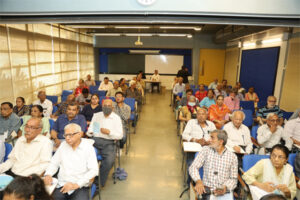- Annually 1 lakh new patients enter for renal transplant program in India: MPUH study
- In context of World Kidney Day, MPUH, Nadiad organizes a seminar on kidney diseases and dialysis treatment
- Diabetes and hypertension are major risk factors for Chronic Kidney Disease
- In India, approximately 20-30% of diabetic patients develop CKD, and about 30-40% of CKD cases are due to hypertension
NE HEALTH BUREAU
AHMEDABAD, MARCH 17
With the advancement in urology and nephrology, kidney transplant offers better longevity and quality of life than dialysis. We have been successfully performing nearly 150 to 160 kidney transplantations by deploying minimal invasive surgery called laparoscopic, and 17,000 to 18,000 dialysis per year, said Urologists & Nephrologists at Muljibhai Patel Urological Hospital (MPUH), a premier institute in India devoted entirely to urology and nephrology in Nadiad here on Saturday.

They were addressing at a thought-provoking seminar on kidney diseases and dialysis treatment in the context of World Kidney Day in Ahmedabad. The aim of the program was to create awareness about the treatment options available to chronic kidney failure patients.
Stressful life, over use of medication, improper dietary habits and junk food having more fatty acids are some primary reasons for increasing kidney dieses in India, says a recent study from Urologists & Nephrologists at Muljibhai Patel Urological Hospital (MPUH), Nadiad.
Elaborating the details of the finding, Dr Ravindra Sabnis, Chairman, Department of Urology, MPUH said, “There are more than 1,00,000 new patients entering renal transplant programs annually in India. Even today, over 90% of patients requiring RTT (Renal Transplant Therapy) in India die because of inability to afford the treatment and even in those who do start RTT, 60% stop the treatment for financial reasons. It has been recently estimated that the age-adjusted incidence rate of ESRD in India to be 229 per million population. Only 10% of the Indian ESRD (Early-Stage Renal Diseases) patients receive any renal transplant therapy due to lack of resources. In our country, family members are the major donors of kidney. Now, awareness on cadaver kidney transplant is spreading among the masses. This will further help the CKD patients to undergo kidney transplants and get a new lease of life.”
“Diabetes and hypertension are major risk factors for Chronic Kidney Disease. In India, approximately 20-30% of diabetic patients develop CKD, and about 30-40% of CKD cases are due to hypertension. Engaging in regular physical activity, eating a balanced diet, and getting enough sleep can help reduce stress levels and improve overall health,” said Dr Abhijit Patil, Consultant Urologist and Transplant Surgeon, MPUH.
Dr. Abhijit Kunnor, Senior Consultant Nephrologist and Transplant Physician, MPUH and Dr. Hardik Patel, Consultant Nephrologist and Transplant Physician, MPUH and other key stakeholders were also present at the event. More than 100 people attended the seminar and gained the knowledge and guidance on kidney diseases.
MPUH is a 160-bed facility with 6 operation theatres, 44 dialysis stations, urology, nephrology, anesthesiology, radiology and pathology departments along with a modern clinical laboratory and blood bank. The hospital also houses a state-of-the-art teaching and training center (Jayaramdas Patel Academic Centre or JPAC) to impart latest knowledge to practitioners and students in the subject area of nephro-urology.
It was set up in 1978 when Dr Virendra Desai, an internationally trained Urologist, approached Jayaramdas Patel, a successful industrialist, philanthropist & educationist – with a vision to give back to his hometown (Nadiad) and serve the local community. He was joined by two prominent humanitarians, Occhavlal Parikh and Prahlad Patel to make his vision a reality.












